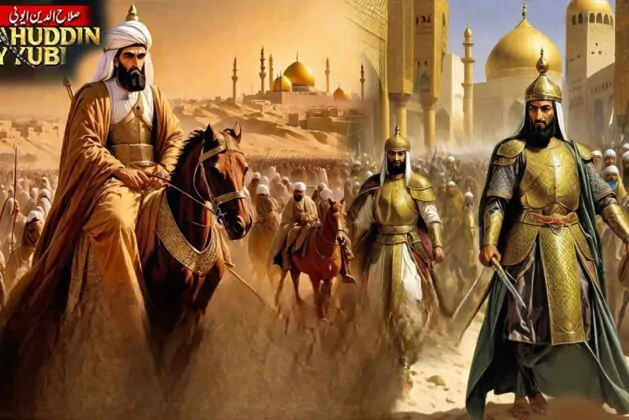Introduction
The pages of history are replete with notable individuals whose courage, insight, and kindness inspire future generations. Of these great men, Sultan Salahuddin Ayubi, popularly referred to as Saladin, is regarded as a model of morality, virtuous leadership, and generosity in Islamic and world history.
In The Crucible of Time Development and Popularity of Salahuddin
Ayubi’s
Salahuddin was born in Tikrit, Mesopotamia, in 1137, during a period of turmoil in the
Islamic world caused by both internal discord and external Crusader aggression. Due to his
upbringing in a military household and his moral upbringing, Salahuddin showed exceptional
leadership skills from a young age. His diverse education which included religious studies
gave him a broad perspective that significantly influenced his decisions going forward.
Salahuddin’s career started with his uncle Shirkuh, a well-known military leader for the
Zengid dynasty. His quick rise through the ranks of the military demonstrated his bravery and
strategic intelligence. Salahuddin became a pivotal player amid Egypt’s unrest; he finally rose
to the position of vizier of Egypt, establishing authority and setting the stage for further
victories. His enduring influence inspires discussions on ethical leadership, religious
tolerance, and conflict resolution.
Salahuddin conquered Jerusalem in 1187
Salahuddin, also known as Saladin. The combination of military might, strategic preparation, and favorable circumstances led to Salahuddin’s conquest of Jerusalem in 1187. Several incidents and conflicts took place during the conquest, chief among them the Battle of Hattin, which finally resulted in Jerusalem’s release from Crusader rule. Salahuddin’s conquest showcased his military prowess and resilience, leaving an indelible mark on Islamic and world history.
Leadership and Governance of Salahuddin Ayubi’s
Salahuddin Ayubi’s leadership and governance were characterized by a unique
blend of ethical principles, military acumen, and compassionate rule. Rooted in a
deep commitment to justice and fairness, Salahuddin’s decisions reflected a high
standard of ethical leadership, earning him respect and admiration. His military
leadership was marked by strategic intelligence and bravery, exemplified by his
triumph in the conquest of Jerusalem in 1187. Beyond military conquests,
Salahuddin’s governance was notable for its compassion and benevolence,
ensuring the well-being of his subjects and fostering prosperity. His diplomatic
finesse in forging alliances and consolidating Muslim power played a crucial role in
uniting diverse forces toward common goals. Salahuddin’s commitment to religious
tolerance and coexistence further underscores his legacy as a revered leader in
Islamic history, leaving an indelible mark on discussions of leadership, governance,
and ethics.
Background to the Crusades
The Crusaders ruled Jerusalem in the twelfth century after taking the city in 1099 during the
First Crusade. The sacred city was extremely important to Muslims religiously, and they
fought to recapture it. As the Sultan of Egypt and Syria at the time, Salahuddin Ayubi made
an effort to bring the Muslim armies together to oppose the Crusader’s presence in the area.
Bringing the Muslim Forces Together
Salahuddin understood that in order to properly oppose the Crusaders, Muslim power had to
be consolidated. He put forth great effort to bring different tribes, factions, and kings together
around the goal of liberating Jerusalem. Salahuddin brought the Muslim troops together to a
degree that had not been accomplished in earlier attempts by means of diplomatic
discussions, alliances, and shrewd political maneuvering.
A Legacy of Leadership and Benevolence
Salahuddin’s persona personified the noble ideals of compassion and honor. His defense of holy places, deference to opponents, and handling of prisoners were all examples of his noble and giving nature. He preserved diplomatic ties and, whenever feasible, worked toward peaceful resolutions in the face of intense hostilities. Salahuddin’s administration and governance were wise and just in addition to his military prowess. He put forth great effort to bring the area together, promoting stability and prosperity. His dedication to fairness and decent governance won him over to his subjects, leaving a legacy that cuts beyond space and time.
Lifelong Impact and Respect
Salahuddin Ayubi’s lifelong impact and enduring respect stem from his exemplary qualities as a leader and his profound contributions to history. The influence of Salahuddin goes much beyond his time. Known for his courage, unity, and tolerance, he is still an inspiration to leaders everywhere. His steadfast moral principles in the face of hardship and his dedication to humanitarian ideals are still relevant today, acting as an inspiration to all who pursue justice and peace. Salahuddin’s example is still used today when discussing ethical leadership, religious tolerance, and resolving conflicts. His legacy serves as evidence of the excellence that may be achieved when empathy and morality are ingrained



Leave a comment